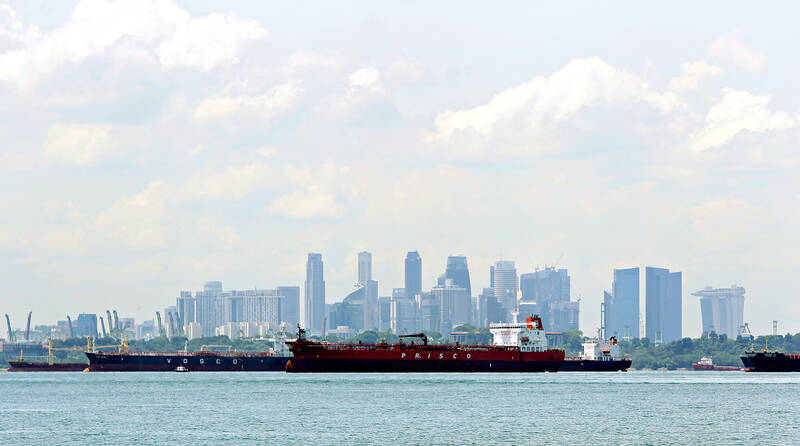Demand is soaring for oil storage tanks in Singapore, a sign that a flood of Russian fuel is being blended and re-exported globally.
Tank space in the city-state is being snapped up due to a rise in interest and profits from mixing cheap fuel supplies from Russia with shipments from other sources, an executive from a tank operator and a consultant who advises traders on the matter said.
That process can help obscure the cargo’s origins, they said.

Photo: Reuters
Singapore has not banned the importation of Russian oil or petroleum products, although financial institutions based in the city-state are prohibited from financing or dealing with Russian goods and companies.
Singaporean government agencies referred to past statements on the ban and price cap policy, without additional comments.
Still, the handling and trading of Russian fuel remain a sensitive issue in the region, with some buyers not wanting to be seen purchasing the cargo.
Russian crude oil and fuel flows to Asia and the Middle East have surged since Moscow’s war in Ukraine prompted Western buyers to turn away in retaliation.
Such shipments have increasingly made their way to blending and redistribution hubs like Singapore and Fujairah in the United Arab Emirates, where they can be co-mingled, repackaged and re-exported globally.
This trend of more Russia-to-Asia shipments and the growing role of hubs in their redistribution might further intensify in the coming weeks, as Europe prepares to roll out new sanctions on Russian petroleum products on Feb. 5.
Oil market participants are keenly watching to see where Russian fuels such as gasoline, naphtha and fuel oil will find homes as many Asian nations are not taking a hard stance on sanctions.
“We have observed an increase in the number of inquiries of short-term storage in the period leading up to December,” a spokesperson for oil storage firm Advario Asia Pacific Pte said via e-mail.
The company verifies the source of products to ensure compliance with Russian sanctions before accepting them, the person added.
A spokesperson for Singapore-based Jurong Port Universal Terminal Pte declined to comment on specific product movements, but said the company complies with all applicable sanctions.
Among other storage firms, Horizon Singapore Terminals Pte did not respond to Bloomberg queries, while a spokesperson for Royal Vopak NV declined to comment.
Advario, Jurong Port, Horizon and Royal Vopak operate commercial tanks in Singapore. A six-month lease for Singapore fuel oil or crude oil storage rose by as much as 20 percent in costs over the course of last year, said executives from tank operator firms.
Ship tracking data by Vortexa Ltd showed that Singapore oil-receiving terminals took in more than double the volume of Russian naphtha and fuel oil last month as compared to a year ago.
Singapore received 2.6 million barrels of naphtha, nearly 40 times the volume taken a year earlier.

PERSISTENT RUMORS: Nvidia’s CEO said the firm is not in talks to sell AI chips to China, but he would welcome a change in US policy barring the activity Nvidia Corp CEO Jensen Huang (黃仁勳) said his company is not in discussions to sell its Blackwell artificial intelligence (AI) chips to Chinese firms, waving off speculation it is trying to engineer a return to the world’s largest semiconductor market. Huang, who arrived in Taiwan yesterday ahead of meetings with longtime partner Taiwan Semiconductor Manufacturing Co (TSMC, 台積電), took the opportunity to clarify recent comments about the US-China AI race. The Nvidia head caused a stir in an interview this week with the Financial Times, in which he was quoted as saying “China will win” the AI race. Huang yesterday said

Nissan Motor Co has agreed to sell its global headquarters in Yokohama for ¥97 billion (US$630 million) to a group sponsored by Taiwanese autoparts maker Minth Group (敏實集團), as the struggling automaker seeks to shore up its financial position. The acquisition is led by a special purchase company managed by KJR Management Ltd, a Japanese real-estate unit of private equity giant KKR & Co, people familiar with the matter said. KJR said it would act as asset manager together with Mizuho Real Estate Management Co. Nissan is undergoing a broad cost-cutting campaign by eliminating jobs and shuttering plants as it grapples

The Chinese government has issued guidance requiring new data center projects that have received any state funds to only use domestically made artificial intelligence (AI) chips, two sources familiar with the matter told Reuters. In recent weeks, Chinese regulatory authorities have ordered such data centers that are less than 30 percent complete to remove all installed foreign chips, or cancel plans to purchase them, while projects in a more advanced stage would be decided on a case-by-case basis, the sources said. The move could represent one of China’s most aggressive steps yet to eliminate foreign technology from its critical infrastructure amid a

MORE WEIGHT: The national weighting was raised in one index while holding steady in two others, while several companies rose or fell in prominence MSCI Inc, a global index provider, has raised Taiwan’s weighting in one of its major indices and left the country’s weighting unchanged in two other indices after a regular index review. In a statement released on Thursday, MSCI said it has upgraded Taiwan’s weighting in the MSCI All-Country World Index by 0.02 percentage points to 2.25 percent, while maintaining the weighting in the MSCI Emerging Markets Index, the most closely watched by foreign institutional investors, at 20.46 percent. Additionally, the index provider has left Taiwan’s weighting in the MSCI All-Country Asia ex-Japan Index unchanged at 23.15 percent. The latest index adjustments are to